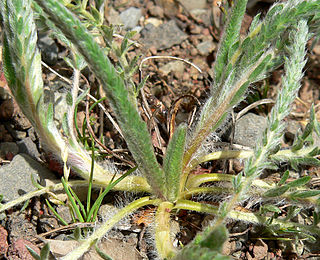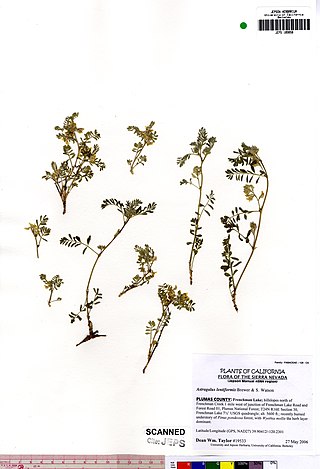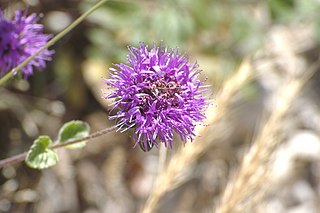
Monardella is a genus of approximately 40 species of annual and perennial plants native to western North America from British Columbia to northwestern Mexico. They are grown for their highly aromatic foliage, which in some species is used for herbal teas. The two-lipped, tubular flowers are formed in terminal clusters and are most usually red, pink, or purple.

Ivesia sericoleuca is a species of flowering plant in the rose family known by the common name Plumas mousetail, or Plumas ivesia.

Astragalus lentiformis is a species of milkvetch known by the common name lens-pod milkvetch. It is endemic to the Sierra Nevada in eastern Plumas County, California, where it grows in chaparral scrub and coniferous forests.

Erigeron petrophilus is a species of flowering plant in the family Asteraceae known by the common names rockloving erigeron or cliff fleabane. It is native to the mountain ranges of California from Siskiyou County south as far as San Luis Obispo County and El Dorado County. It also grows in southwestern Oregon.
Hackelia amethystina is a species of flowering plant in the borage family known by the common name amethyst stickseed.
Boechera constancei is a species of flowering plant in the mustard family known by the common name Constance's rockcress. It is endemic to California, where it is known only from the northern Sierra Nevada of Plumas and Sierra Counties. It is a member of the serpentine soils flora. This is a perennial herb growing from a branching, woody caudex. It produces one or more erect, hairless stems to maximum heights between 15 and 30 centimeters. The caudex is surrounded by a dense basal rosette of stiff, blue-green, lance-shaped leaves up to 3 centimeters long. There may be a few smaller leaves along the stem. The inflorescence produces 5 to 10 white mustardlike flowers with protruding stamens. The fruit is a hanging green silique 4 or 5 centimeters long which contains round, winged seeds.

Harmonia stebbinsii is a species of flowering plant in the family Asteraceae known by the common name Stebbins' tarweed, or Stebbins' madia. It is endemic to northern California, where it is limited to the Klamath Mountains and adjacent slopes of the North Coast Ranges. It is a member of the serpentine soils plant community in these mountains, found at elevations of 1100–1600 meters. It is a rare annual herb producing a bristly stem up to about 25 centimeters tall studded with black resin glands. Its bristly leaves grow up to about 2 centimeters long and are mostly gathered near the base of the plant. The inflorescence is an array of flower heads lined with hairy, glandular, purple-tipped phyllaries. The head has a few yellow ray florets several millimeters long and yellow disc florets. The fruit is an achene tipped with a pappus.
Monardella beneolens is a rare species of flowering plant in the mint family known by the common name sweet-smelling monardella.
Monardella candicans is a species of flowering plant in the mint family known by the common name Sierra monardella.

Monardella douglasii is a species of flowering plant in the mint family known by the common name Douglas' monardella.

Monardella follettii is an uncommon species of flowering plant in the mint family known by the common name Follett's monardella.
Monardella linoides is a species of flowering plant in the mint family known by the common name flaxleaf monardella.
Monardella palmeri is a species of flowering plant in the mint family known by the common name Palmer's monardella.
Monardella sheltonii is a species of flowering plant in the mint family known by the common name Shelton's monardella.

Monardella undulata is an uncommon species of flowering plant in the mint family known by the common name curlyleaf monardella. It is an annual herb and is endemic to the coast of California.
Phacelia stebbinsii is an uncommon species of phacelia known by the common name Stebbins' phacelia.
Silene serpentinicola is a rare species of flowering plant in the family Caryophyllaceae known by the common name serpentine Indian pink and serpentine catchfly.
Trichostema rubisepalum is a species of flowering plant in the mint family known by the common name Hernandez's bluecurls.
Monardella stoneana is a rare species of flowering plant in the mint family known by the common name Jennifer's monardella.
Sedum moraniii is a rare species of flowering plant in the family Crassulaceae known by the common name Rogue River stonecrop. It is endemic to Oregon in the United States, where it only grows in Josephine County next to the Rogue River.
This page is based on this
Wikipedia article Text is available under the
CC BY-SA 4.0 license; additional terms may apply.
Images, videos and audio are available under their respective licenses.








